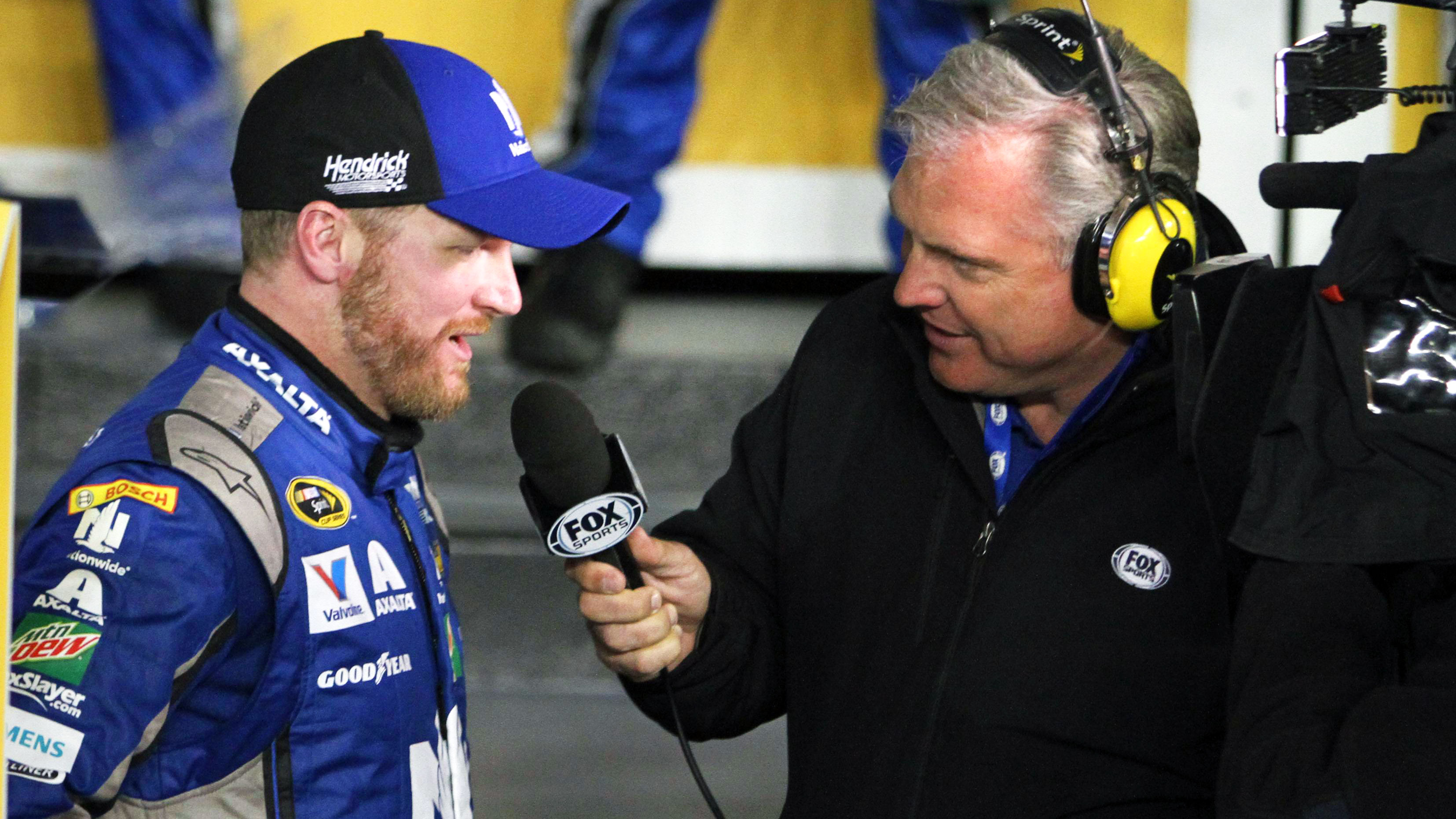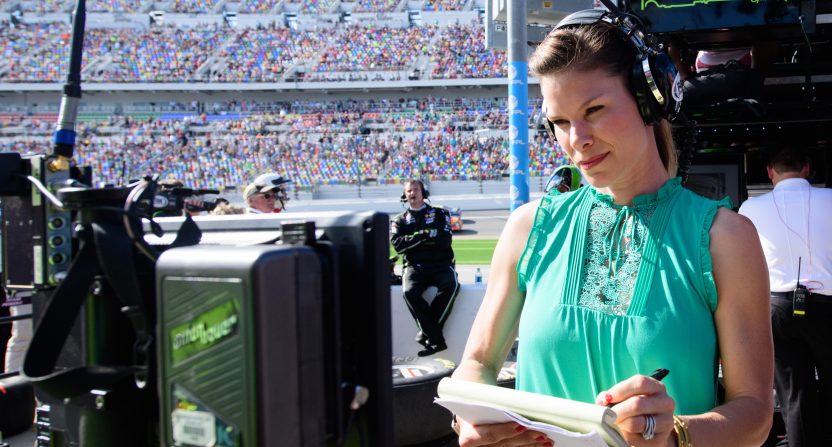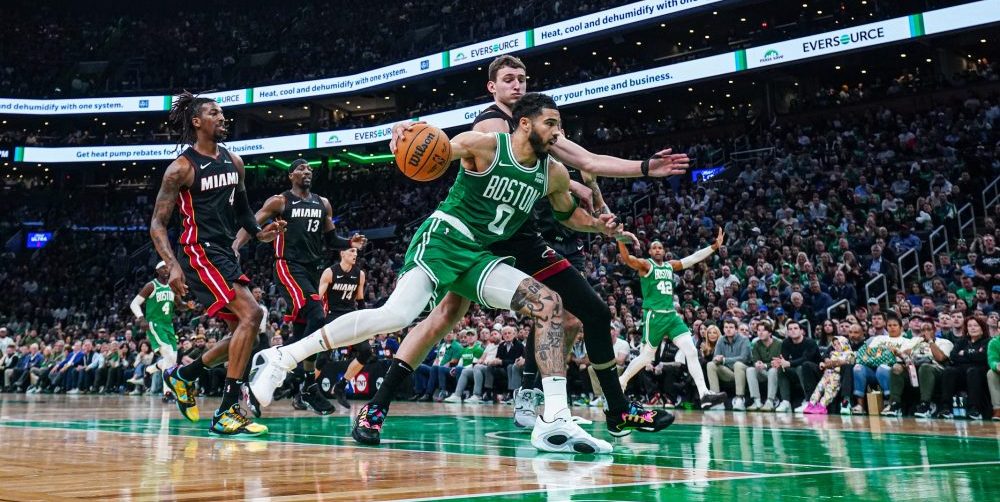What does a pit reporter do?
A typical week for a pit reporter doesn’t just start at the track on Friday. As Jamie Little said, “When you’re a pit reporter for NASCAR, it’s not just a job it’s a lifestyle.” Their week officially begins Tuesday with a conference call that can last 60-90 minutes. There, on-air personalities as well as producers are on the call going over the previous race and pitching potential storylines for the next race.
Normally, the time between Tuesday and Thursday is spent studying and preparation before needing to travel for the next race on Thursday. But as with anything, each person has their own style of how to do things. For instance, Regan Smith prefers to flip that around and get his work done Monday and Tuesday, so he can have a light day with family on Wednesday before traveling to the racetrack on Thursday.
Friday, the crew hits the track and once you get to the track, it is on. As Matt Yocum noted, “Once you get to the racetrack, what you have is what you have. It’s a lot like a race team.” Friday to Sunday, it is 10-12 hour days each day of pit reporters getting anything and everything that might be useful for fans. Jamie Little said, “When I first came into NASCAR. I feel like if somebody sneezes, you better be ready to tell the story because there is a fan that cares about that driver and about him sneezing.”

As someone who began racing cars at the track, Regan Smith got a learning experience on just how hard pit reporters are working throughout the week. But it was something he welcomed as he became a full-time pit reporter.
“I think the thing that was most surprising to me was that it is a lot of hard work,” Smith said. “It’s not easy. It’s a seven day job basically during our portion of the season. And that doesn’t count if I’m on Race Hub or doing any other stuff like that. Just getting all the notes and information together and preparing everything.”
“I joke with people that as a driver, in almost 15 years of being in the garage areas, I can count on one hand how many times up until last year I had seen the garage open or close. And last year, I think I saw it open and close every week of the race season. So it was pretty funny, that was definitely unique for me.”
While the viewer may not see it, preparation is important as a pit reporter. Entering Daytona, not only do they need to get everything down for the biggest race of the year, they need to keep track of all the offseason changes as well. And for Vince Welch, he has to make sure he doesn’t call the NASCAR Gander Outdoors Truck Series by its previous name when he does play-by-play.
“[Laughter] At least for the Truck Series, I’ll have a big sign telling me, reminding me that one,” Welch joked. “So I’m sure I’ll stumble and call it the wrong name at some point. I hope not but I wouldn’t count against it.”
Just like when pit reporters study, how they study also depends on the person. Matt Yocum, who has been a pit reporter for nearly 25 years, was writing out all his notes “on an 11 x 14 posterboard” when he started. Technology has helped Matt streamline the process, “by 80 percent” according to him, but he still utilizes his boards during races.

By living in the Charlotte area, Yocum is able to visit race shops during the week and talk to various teams as he preps by reviewing the previous broadcast and watches last year’s race. It’s that personal connection that Matt strives to get across to the viewer and give viewers a “name to the face” with those working in the garage.
“When you look at NASCAR, there’s that human connection that I think you get with our sport versus any other,” Yocum said. “Just because, fans can walk through the garage area and if you look at an NFL game, you don’t see the practices televised. And you don’t see scrimmages typically televised, all you see are the games. In our sport, from the time they roll out on the racetrack until they drop the checkered flag on Sunday, we typically have everything covered so the diehards are seeing different things in practice. Things you wouldn’t see if we only televised the races.”
“I think that’s why you see the core race fan, especially the NASCAR fan, they know so much. And that’s why we’re basically given the freedom to take it a little more “inside the game” during practice sessions.”
“Everybody has a great story and you don’t just show up at the track. You come from somewhere and typically there’s a great story behind it.”
There are so many things that go into making a good pit reporter. Just like any career, being able to multitask and being a hard worker certainly play into that. But there’s more that goes into it. Live TV is one scary beast, and someone needs to be comfortable speaking to millions of people.
In addition, live TV also means that sometimes things are done on the fly depending on what happens during the race. Because of that, a skilled pit reporter not only needs to know what they’re talking about, they need to be specific and succinct within a certain period of time and make sure they don’t overcomplicate things to confuse new fans while not oversimplifying things to bore diehard fans.
While there are producers in the truck, multiple people remarked the need to self-produce yourself and choose in real-time what is or isn’t necessary for the viewer at home. In addition, Jamie Little explained that a great pit reporter also needs to have great relationships and to be unafraid and be willing to ask the tough questions when that time comes.
“Somebody that’s not bashful [would make a good pit reporter], obviously,” Little said. “You have to have great relationships with people because that’s everything in this business. You have to have relationships, you have to know the right people to go to when something happens or to get storylines or to be tipped off on any storylines. You just have be really confident. You’re on the spot, you’re putting people on the spot and you’re self-producing so you have to think like a producer.”







